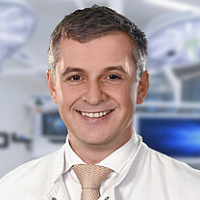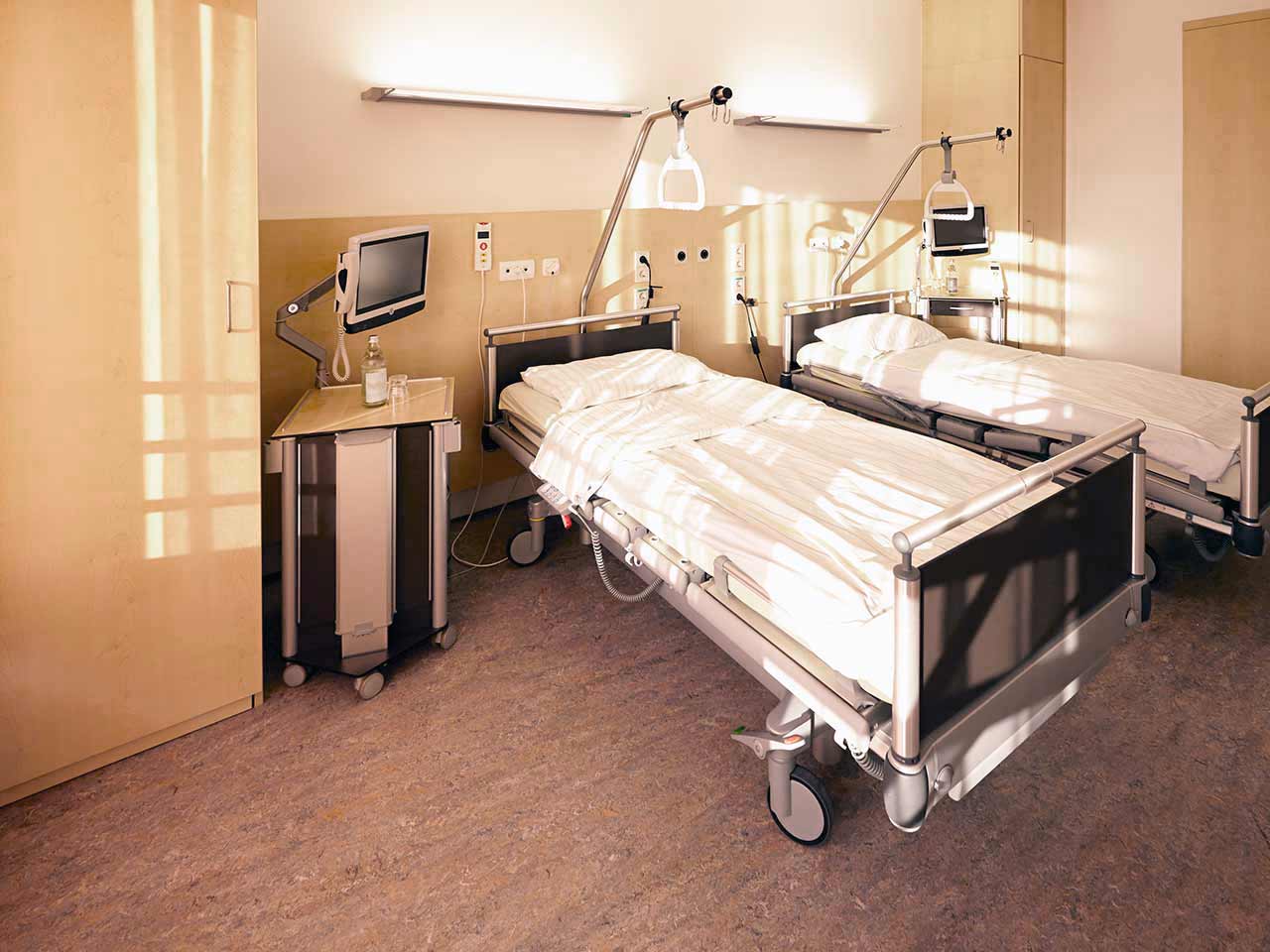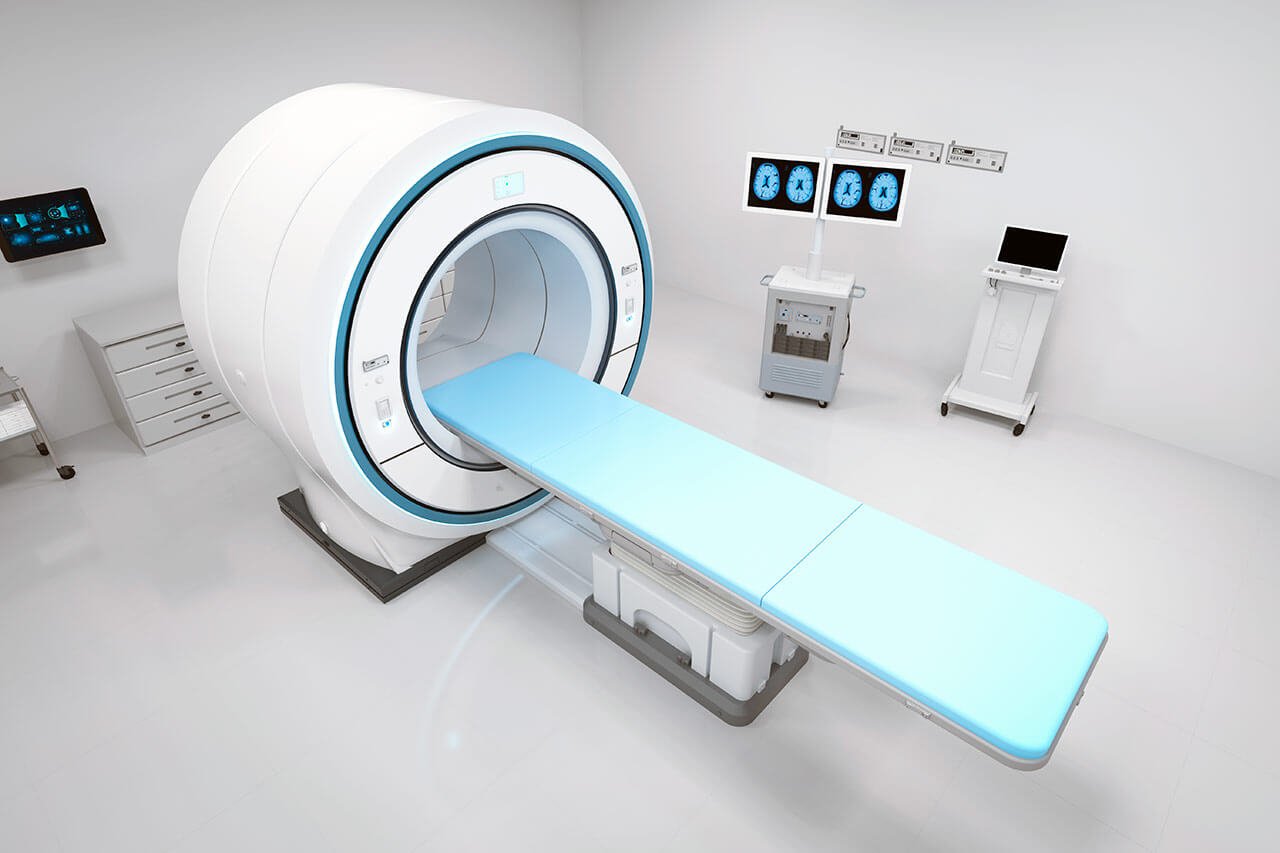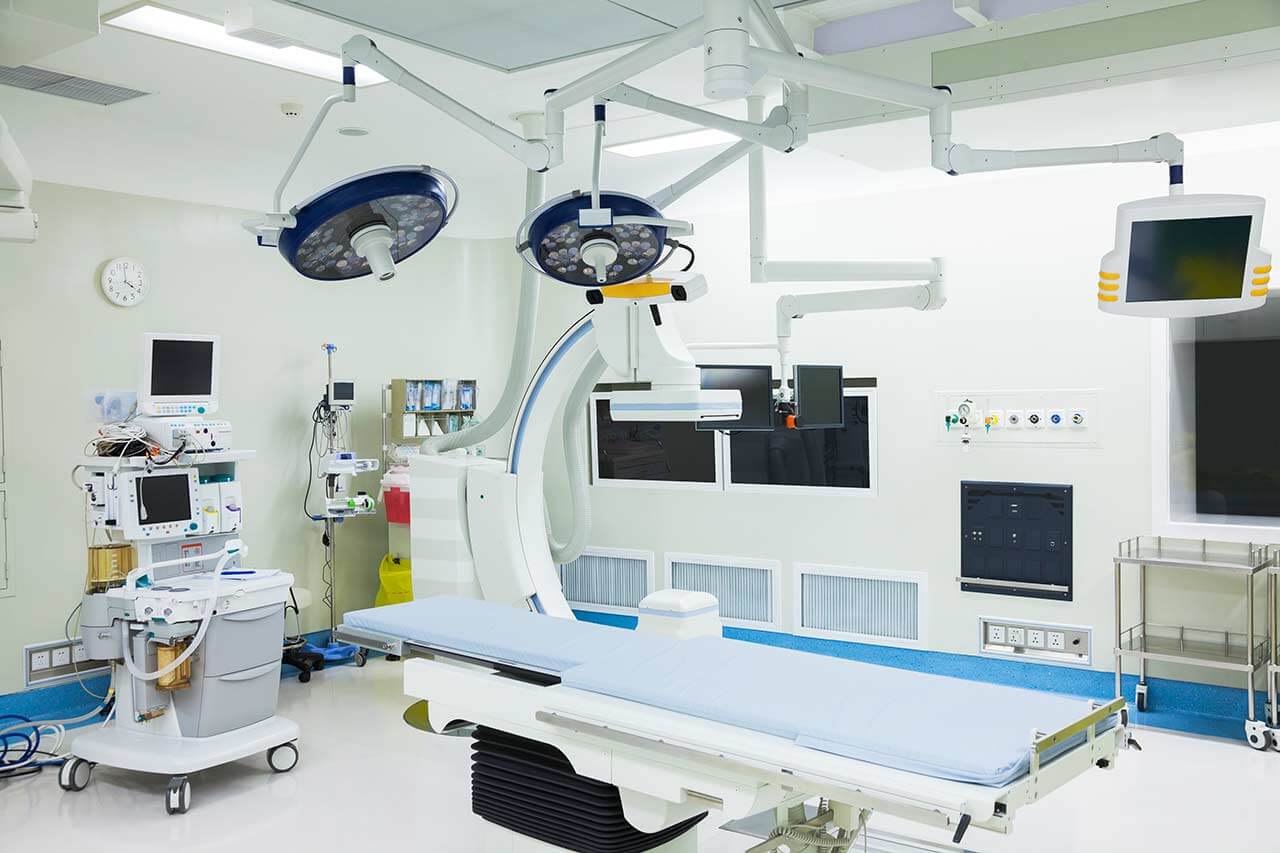
The program includes:
- Initial presentation in the clinic
- clinical history taking
- physical examination
- review of medical records
- laboratory tests:
- complete blood count
- general urine analysis
- biochemical analysis of blood
- indicators of inflammation
- indicators blood coagulation
- X-ray
- CT/MRI scan
- preoperative care
- surgical removal of metal implant
- symptomatic treatment
- control examinations
- the cost of essential medicines and materials
- nursing services
- full hospital accommodation
- explanation of future recommendations
Required documents
- Medical records
- X-ray examination (if available)
- MRI/CT scan (if available)
Service
You may also book:
 BookingHealth Price from:
BookingHealth Price from:
About the department
The Department of Adult and Pediatric Trauma Surgery, Hand Surgery at the ViDia Hospital Karlsruhe provides top-class medical care to patients with musculoskeletal injuries of any severity and specializes in the treatment of hand diseases and injuries. The department's doctors have effective conservative and surgical methods in their arsenal to treat injuries. The department's specialists strive to ensure the fastest possible recovery of function, ability to work, and a decent quality of life for patients with the help of modern therapies. The department houses the first German Shoulder and Elbow Surgery Center certified by the German Association for Shoulder and Elbow Surgery (DVSE). In 2008, the first Geriatric Trauma Center in the state of Baden-Wuerttemberg was also founded here. The department's specialists often admit patients with sports injuries, so they have a wealth of experience in this field. The department's operating rooms are adapted for minimally traumatic surgical procedures on bones, joints, tendons, and muscles. Hand surgery is performed using advanced microsurgical techniques. The department's doctors prefer an individual approach to the patient's medical care, which contributes to the high efficiency of treatment. The department is headed by Prof. Dr. med. Lars-Johannes Lehmann.
The department's primary focus is shoulder and elbow surgery. It is noteworthy that Prof. Lars-Johannes Lehmann has repeatedly been ranked among the top experts in this field. Patients with shoulder and elbow injuries are treated in the specialized center, which received the quality certificate from the German Association for Shoulder and Elbow Surgery (DVSE) in September 2019. Currently, the medical facility is the only one in Germany with such a certification. The department's doctors have the necessary resources and facilities for comprehensive diagnostics and treatment of patients with shoulder and elbow injuries. Treatment begins with an outpatient consultation, after which doctors proceed to imaging diagnostics and, if necessary, emergency medical care. If surgery is indicated based on the diagnostic results, minimally invasive arthroscopic techniques are considered whenever possible. During arthroscopic interventions, regional anesthesia is used, so patients do not experience any pain. The department's doctors perform more than 1,000 operations for shoulder and elbow diseases and injuries every year. Following surgery, patients undergo physiotherapy to restore upper limb function.
The department also houses a Geriatric Trauma Center, where elderly patients with injuries of varying severity receive medical care. It is no secret that the treatment of bone fractures in the elderly is a rather complex clinical task. This is due to the presence of concomitant pathologies, including diabetes mellitus, arterial hypertension, heart failure, etc. The department's specialists offer an innovative concept of trauma therapy for elderly patients, involving close cooperation between traumatologists and geriatric specialists. Patients receive comprehensive medical care, starting with preoperative preparation and ending with a special rehabilitation program adapted to the needs of elderly patients. The Geriatric Trauma Center has implemented a quality management system that ensures structured and standardized treatment with constant monitoring and analysis of results. Such an approach guarantees high-quality medical care, and the ISO 9001:2008 certification is a good confirmation. The main goal of the department's doctors is to provide injured elderly patients with the opportunity to receive qualified care within a single medical facility. In addition, it is important for the specialists to improve the quality of life of elderly people and provide them with maximum independence in their everyday lives.
The department is also competent in the treatment of hand diseases and injuries. The primary focus for the specialists is providing emergency medical care for hand injuries, but there is also vast experience in caring for patients with functional hand disorders caused by certain diseases. Hand surgery is performed using modern microsurgical techniques, which involve the use of advanced surgical microscopes during the procedures. The use of state-of-the-art equipment and the exceptional professionalism of the surgeons allow for the restoration of even the tiniest nerve endings, blood vessels, extensor tendons, and flexor tendons of the fingers. Stabilizing implants are used to treat finger fractures, and soft tissue defects are restored during reconstructive surgery.
The department's clinical focuses include:
- Trauma surgery
- Treatment of shoulder injuries and diseases
- Treatment of shoulder muscle and tendon injuries
- Arthroscopic and open interventions for rotator cuff repair
- Arthroscopic interventions for SLAP syndrome
- Arthroscopic tenodesis
- Treatment of shoulder impingement syndrome
- Shoulder arthroscopic subacromial decompression
- Treatment of shoulder instability
- Arthroscopic and open shoulder stabilization after dislocation
- Reconstructive plastic surgery for acromioclavicular joint dislocation
- Treatment of shoulder arthrosis
- Shoulder cartilage tissue restoration
- Partial and total shoulder replacement surgery using arthroscopic techniques
- Arthrolysis for frozen shoulder
- Treatment of shoulder fractures: fractures of the proximal humerus and shoulder girdle
- Treatment of shoulder muscle and tendon injuries
- Treatment of elbow injuries and diseases
- Arthroscopic interventions for epicondylitis
- Arthroscopic interventions for elbow stiffness
- Arthroscopic interventions for elbow instability
- Arthroscopic interventions for elbow arthritis
- Arthroscopic interventions for cubital tunnel syndrome
- Neurolysis
- Treatment of geriatric injuries
- Conservative and surgical treatment of injuries of any severity in elderly patients
- Treatment of injuries in children
- Conservative and surgical treatment of injuries of any severity in children
- Treatment of sports injuries
- Treatment of knee injuries
- Arthroscopic interventions for meniscus tears
- Arthroscopic interventions for patellar instability
- Plastic surgery on the cruciate ligaments, including revision interventions
- Cartilage cell transplantation
- Treatment of ankle injuries
- Cartilage cell transplantation
- Arthroscopic interventions for ankle instability
- Arthroscopic interventions for ankle ligament injuries
- Treatment of knee injuries
- Septic surgery
- Interventions for osteomyelitis
- Interventions for joint infections
- Treatment of shoulder injuries and diseases
- Hand surgery
- Arthroscopic interventions for wrist diseases and traumatic injuries
- Finger joint replacement surgery
- Microsurgical interventions for Dupuytren's contracture
- Microsurgical interventions for triggering fingers (stenosing ligamentitis)
- Microsurgical interventions for hand compression syndromes
- Microsurgical interventions for benign and malignant hand tumors
- Microsurgical interventions for rheumatic hand lesions
- Microsurgical interventions for hand dysfunction due to traumatic injuries
- Other medical services
Curriculum vitae
Since April 1, 2014, Prof. Dr. med. Lars-Johannes Lehmann has been the Head Physician of the Department of Adult and Pediatric Trauma Surgery, Hand Surgery at the ViDia Hospital Karlsruhe.
In 2006, Prof. Lehmann headed the Section for Upper Limb Injuries and Diseases, and in 2008, he held the position of Managing Senior Physician and Deputy Head of the Center for Orthopedics and Trauma Surgery at the University Hospital Mannheim.
His primary clinical and research focus is on shoulder and elbow surgery, the treatment of sports injuries, and highly severe injuries, including polytrauma.
After studying medicine at Johannes Gutenberg University Mainz, Prof. Lehmann began his specialized training in orthopedics at the Schulthess Clinic in Zurich and the ATOS Clinic in Heidelberg. He continued his clinical practice at the Bundeswehr Central Hospital Koblenz and at the Center for Orthopedics and Trauma Surgery at the University Hospital Mannheim. Prof. Lehmann was board certified in Orthopedics and Trauma Surgery. The doctor also received additional qualifications in surgical orthopedics, special trauma surgery, and special orthopedic surgery.
After his thesis defense on the examination of patients with severe trauma, Prof. Lehmann began publishing scientific papers in the area of his specialization, including the treatment of pathologies and injuries to the upper limbs. The specialist focuses on joint replacement surgery, sports injuries, and muscle plastic surgery.
Prof. Lehmann is a Member of the German Society for Orthopaedics and Orthopaedic Surgery (DGOOC) and a Member of the governing committee of this society. In addition, Dr. Lehmann is a Member of the European Society for Surgery of the Shoulder and the Elbow (SECEC) and the Society for Arthroscopy and Joint Surgery (AGA).
Prof. Lehmann holds the position of 1st Vice President and Chairman of the Commission "Guidance and Assessment" in the German Society for Shoulder and Elbow Surgery (DVSE). Prof. Lehmann is a Scientific Coordinator of the journal "Obere Extremität", an Author of numerous textbooks, and a Reviewer for many scientific journals in orthopedics and traumatology.
According to the Focus magazine, Prof. Lehmann has been regularly ranked among the top specialists in shoulder surgery since 2013.
Photo of the doctor: (c) ViDia Kliniken Karlsruhe
About hospital
The ViDia Hospital Karlsruhe is a modern medical facility with a rich history and traditions. The medical complex is an academic hospital of the University of Freiburg, granting patients access to advanced university medicine and the very latest therapeutic developments. The hospital first opened its doors in 1851 and, since then, has maintained a leading position in the European medical arena. The health facility offers a state-of-the-art technical base, comfortable infrastructure, and highly qualified doctors. All this allows the hospital to provide patients with top-class healthcare in accordance with modern standards. In addition, the hospital's team honors Christian traditions, emphasizing a humane attitude towards the patient and striving to provide understanding and support.
The hospital employs a large team of specialists, consisting of over 3,200 staff members, including 400 highly qualified physicians. The medical team admits more than 50,000 inpatients every year, and about 100,000 patients are diagnosed and treated on an outpatient basis or in a day hospital. More than 3,000 babies are born in the maternity rooms of the Department of Obstetrics every year. More and more patients, including those from abroad, come to the hospital for medical care annually.
The hospital has 24 specialized departments with 25 highly certified, narrowly focused centers integrated into them. A large Cancer Center certified according to the German Cancer Society (DKG) standards also operates here. Thus, one of the main clinical focuses of the medical complex is cancer treatment. The hospital also excels in other specialties, such as general surgery, abdominal surgery, thoracic surgery, orthopedics, cardiology, endocrinology, otolaryngology, pulmonology, gastroenterology, and others. There are 37 operating rooms available here for surgical treatment, the equipment of which corresponds to the highest technical level. Priority is given to performing minimally traumatic operations using minimally invasive, endoscopic, arthroscopic, and endovascular techniques.
The ViDia Hospital Karlsruhe enjoys a high reputation in Germany and far beyond its borders. The health facility successfully combines innovative medicine with Christian values, thanks to which the patient receives not only effective treatment but also care, understanding, and support.
Photo: (с) depositphotos
Accommodation in hospital
Patients rooms
The patients of the ViDia Hospital Karlsruhe stay in comfortable single and double rooms with modern design. Each patient room has an ensuite bathroom with a shower and a toilet. The standard room furnishings include an automatically adjustable bed, a bedside table, a table and chairs, a wardrobe, a telephone, a TV, and a radio. Wi-Fi access is also available in the patient rooms.
Patients can also be accommodated in enhanced comfort rooms. These rooms are very spacious and are additionally equipped with a safe, a mini-fridge, and upholstered furniture.
Meals and Menus
The patients of the hospital are offered three tasty meals a day: breakfast is served buffet-style, and there are several set menus to choose from for lunch and dinner.
If, for some reason, you do not eat all of the foods, you will be offered an individual menu. Please inform the medical staff about your dietary preferences prior to treatment.
Further details
Standard rooms include:
![]() Toilet
Toilet
![]() Shower
Shower
![]() Wi-Fi
Wi-Fi
![]() TV
TV
Religion
There are several chapels on the territory of the hospital. Regular Catholic and evangelical services are held here. Patients can also visit one of the chapels at any time to find a quiet place to pray, if desired.
Accompanying person
Your accompanying person may stay with you in your patient room or at the hotel of your choice during the inpatient program.
Hotel
You may stay at the hotel of your choice during the outpatient program. Our managers will support you for selecting the best option.





